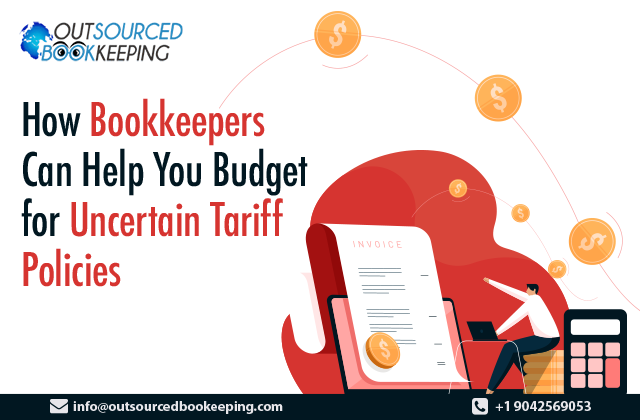In today’s global economy, tariff policies can shift quickly, often with little warning. These changes can impact the cost of imported goods, disrupt supply chains, and create pricing volatility for businesses. For companies reliant on cross-border trade, navigating these uncertainties requires strategic financial planning. This is where bookkeepers step in as essential partners, helping businesses adjust and adapt through effective budgeting.
Accurate financial management becomes even more critical when tariffs are unpredictable. Businesses must prepare for sudden price hikes, currency fluctuations, and evolving trade agreements. Professional bookkeepers provide the insights, structure, and support necessary to safeguard operations during such volatile times.

Understanding the Impact of Tariff Uncertainty
Tariffs are charges levied on imported or exported products by the government of a particular country. Although they are applied to safeguard local industries, retaliatory tariffs or policy changes can cause fluctuations in the financial sector. The effects of tariffs on the financial aspect of the business are related to the rise in the cost of products, a shrinking profit margin, and a slow delivery rate.
Importing firms are forced to pay more for the materials or products they import, and this either has to be taken by the firms or passed on to the consumers. On the other hand, exporters may face decreased competitiveness in the foreign markets due to the following reasons. In either case, there is uncertainty regarding the tariffs, which affects financial planning and puts pressure on cash flow.
The Role of Bookkeepers in Managing Tariff Volatility
Bookkeepers are involved in the preparation of financial strategies that complement changing trade conditions. They assist businesses in tracking and forecasting tariff policy changes in real-time, hence enabling them to be ready for the shifting standards.
Bookkeepers also play a fundamental role in the area of budgeting. They analyse the current financial situation, forecast the future, and develop variable budgets that can include changes in tariffs. These budgets assist companies in assessing the effects of various policy scenarios and in making the right decisions on inventory, prices, and procurement.
Bookkeepers also identify areas of excess spending and assist in minimising such costs through tracking daily transactions and expenses. This can help in better resource management and an improved financial position for organisations, especially during volatile periods.
Budgeting During Tariff Changes: A Proactive Approach
Budgeting during tariff changes is a sensitive area that needs to be managed with complete precision. It is important for businesses to be prepared to make changes to their financial plans depending on the changes in tariffs. Bookkeepers can develop complex budgeting models that can be sensitive to a number of factors, such as:
- Currency exchange rate volatility
- Tariff rate changes
- Supplier cost fluctuations
- Delays in customs clearance
These models help business owners to anticipate future changes before they happen and act as a financial safety net. Bookkeepers can also prepare contingency budgets that allow a business to operate in the worst-case scenario without compromising its operations.
Besides, through historical data, bookkeepers can identify fluctuations in trade costs and the effects of seasonal tariffs so that the business can schedule imports or exports at the most appropriate time of the year.
Enhancing Financial Risk Management
It is important to note that the goal of managing risks associated with tariff changes is not to avoid risks. It is about being ready to take them without much interruption. Bookkeepers assist businesses in determining the risks present within the supply chain, assessing the different options of sourcing and the costs that are associated with them.
They also assist in the establishment of reserves and emergency funds so that the company can continue to operate in the event of a cost increase. The information gathered helps business leaders to have adequate visibility of the financial situation. It assists them to negotiate better deals with suppliers or to identify domestic sources where possible.
Bookkeepers give early signs of financial pressure by preparing balance sheets and cash flow reports regularly. These insights help in making quick decisions and in preventing small problems from turning into big financial losses.
Conclusion: The Strategic Advantage of Professional Bookkeeping
In an environment where tariff policies are becoming more volatile, professional bookkeepers not only record financial transactions, but they also advise. Budgeting, forecasting, and financial risk management for tariff changes are some of the ways through which businesses are able to remain stable in the global environment.
Bookkeeper services for budgeting help companies create a strong financial plan that can be used to shield the business from financial risks. In this way, bookkeepers contribute to the development of effective approaches to budgeting during the implementation of tariff policies. In conclusion, it is only possible to have a strong financial plan that will help to counteract the effects of external shocks, and the bookkeepers are the professionals that businesses require in the storm.








